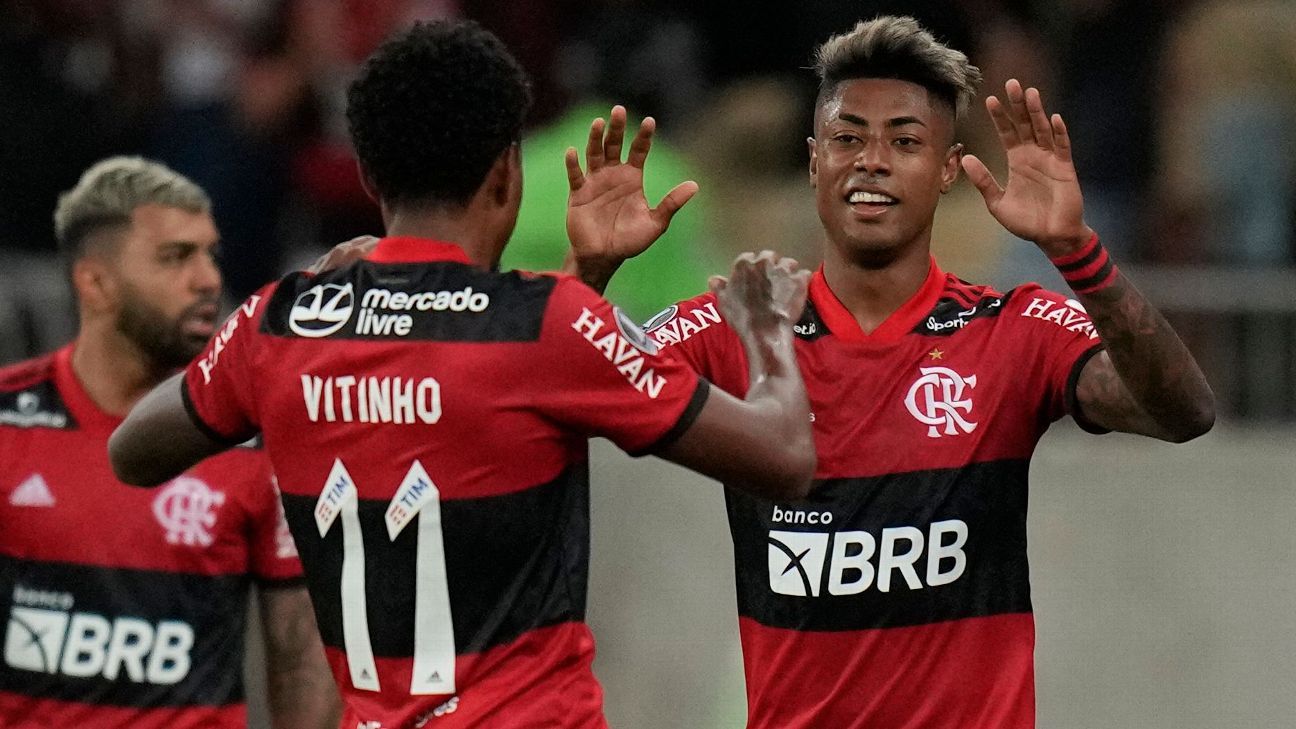Products You May Like
When David Luiz made his debut for Flamengo in the semifinal of the Copa Libertadores, he was representing the Goliath of the story. There can be no doubt that Barcelona SC of Ecuador went into the first leg in Rio de Janeiro’s Maracana stadium as David.
The difference between the two clubs was made very clear by Amir Somoggi, a Brazilian expert in football finance. Flamengo’s annual expenditure on football, he points out, is around $110 million. Barcelona’s is $3 million. The data makes it clear why, for the second year running, the Libertadores looks likely to end with an all Brazilian final.
– ESPN+ guide: LaLiga, Bundesliga, MLS, FA Cup, more (U.S.)
– Stream ESPN FC Daily on ESPN+ (U.S. only)
– Don’t have ESPN? Get instant access
A trio of super-clubs have emerged in the country, opening up gaps with their domestic rivals — and even bigger ones with the rest of the continent. It is becoming very hard for the other countries to compete.
But the Ecuadorian David came out keen to show that their sling was loaded. Flamengo keeper Diego Alves was a busy man for the first fifteen minutes. After a Barcelona corner was half cleared he hang to plunge low to his left to push out a shot from Uruguayan centre forward Gonzalo Mastriani, and then get up quickly to block a high volley from Adonis Preciado.
Soon afterwards he had to turn a shot from right back Byron Castillo round at the near post- and there was a desperate dive when Preciado chested back for a Mastriani volley that flew just wide — to the despair of Barcelona coach Fabian Bustos, well aware of the importance of an away goal and of the fact that much of the action would be taking place at the other end of the field. Barcelona are an attractive, ball playing team. But the key question about this first leg was their capacity to defend against Flamengo’s array of attacking talent.
Football, of course, is not only decided by money. Ideas are crucial. And it could not be clearer that a key moment in the new era of Brazilian domination was Flamengo’s hiring of Portuguese coach Jorge Jesus in the middle of 2019. Jesus built his side around an attacking quartet — striker Gabriel Barbosa and Bruno Henrique backed up by playmakers Everton Ribeiro and the Uruguayan Giorgian De Arrascaeta.
In hindsight it looks like insanity. But in the cautious mindset of Brazilian football at the time, it was not considered possible to field all four in the same side. Instead, for more than two years they have torn apart defence after defence. Injured, De Arrascaeta was unavailable for this game. But Flamengo have a squad of intimidating depth, and his replacement Vitinho brought speed and directness to the dance – and Flamengo could keep on posing questions until the Barcelona defence was unable to come up with the answer. Gabriel Barbosa flighted an excellent left footed cross from deep on the right, and Bruno Henrique – an intoxicating mixture of winger and penalty area striker — rose to the fourth floor to head back across goal and open the scoring.
Barcelona responded by doing what they do — trying to weave their passing movements. But there is no margin for error against a Flamengo on song — and roared on by the return of a crowd. They had 6,000 in the stadium for a domestic cup game last week. This time more than 20,000 were allowed to be present, and they were seeking to make up for a a year and a half without being able to see their team in person.
They had more to cheer when a Barcelona move broke down deep in the Flamengo half – and the front four combined at dazzling pace. Everton Ribeiro found Gabriel in space on the left. Vitinho overlapped, and squared for Bruno Henrique to tap in at the far post. Barcelona were by now terrified of the Flamengo counter attack. And in the last action of the first half, defensive midfielder Nixon Molina was panicked into stopping a counter at source, crudely fouling Bruno Henrique. It was his second yellow card, and, two goals down with the crowd baying for more, they now had to face the entire second half with ten men.
Playmaker Damian Diaz was sacrificed at the interval for the inclusion of giant holding midfielder Michael Carcelen. He nearly made a name for himself right at the start of the second half, when another Barcelona corner was only half cleared, and his shot forced another fine save from Diego Alves. But Carcelen and his teammates spent most of their time closer to their own goal, trying to withstand the constant waves of attacks. With Barcelona defending deeper, Flamengo no longer had the counter attack available to them, and in reduced space they missed the subtlety that De Arrascaeta can provide.
On loan from Manchester United, Andreas Pereira was sent further up the pitch to try and unlock the defence, but it was not his night. An air of frustration permeated the evening, and spilled over when, waiting for a corner, centre back Leo Pereira was sent off for throwing an elbow, making the last few minutes ten against ten.
With occasional alarms, Barcelona managed to dig in and defend with enough resolve to give themselves a chance back on home ground next week. In the story Goliath never got a second chance for revenge. But until next Wednesday Ecuador’s David can still dream of the heroics needed to bring down the Brazilian side.
